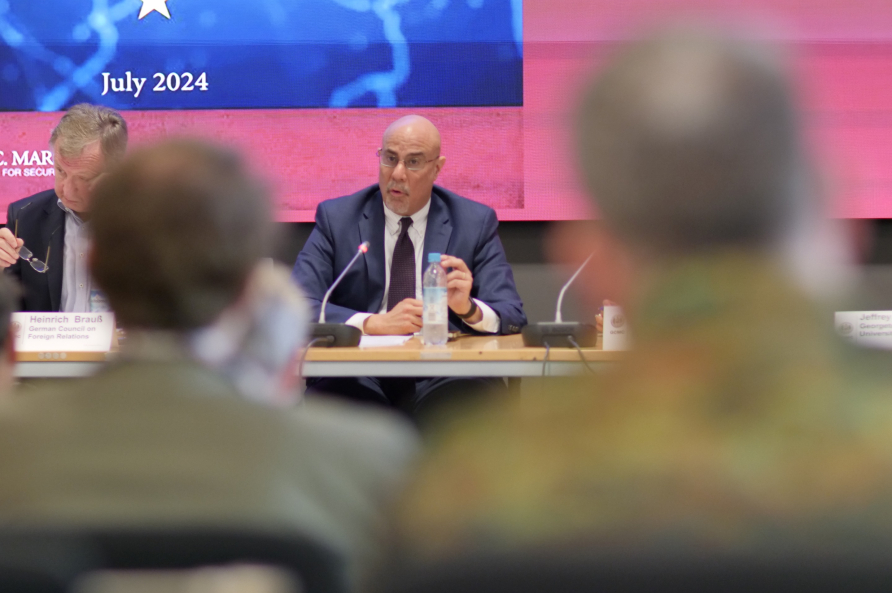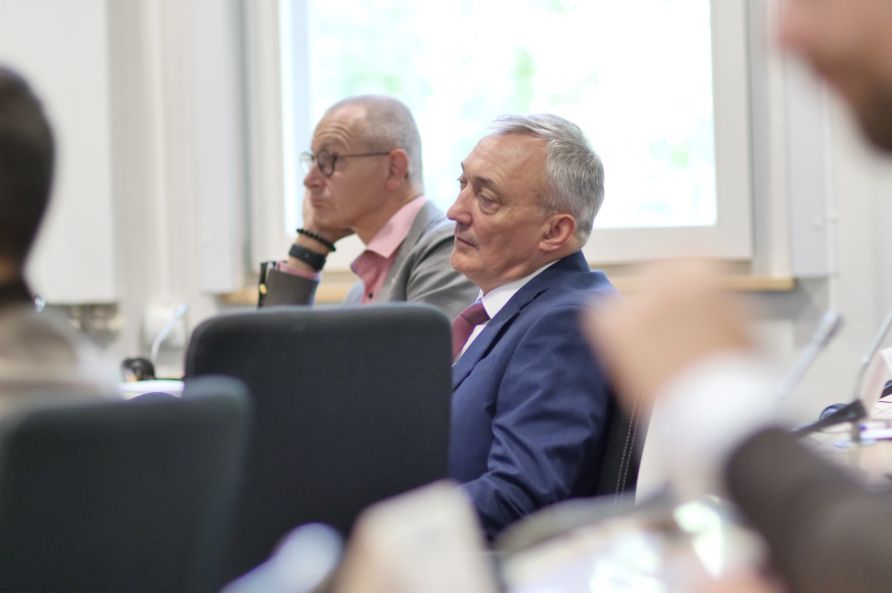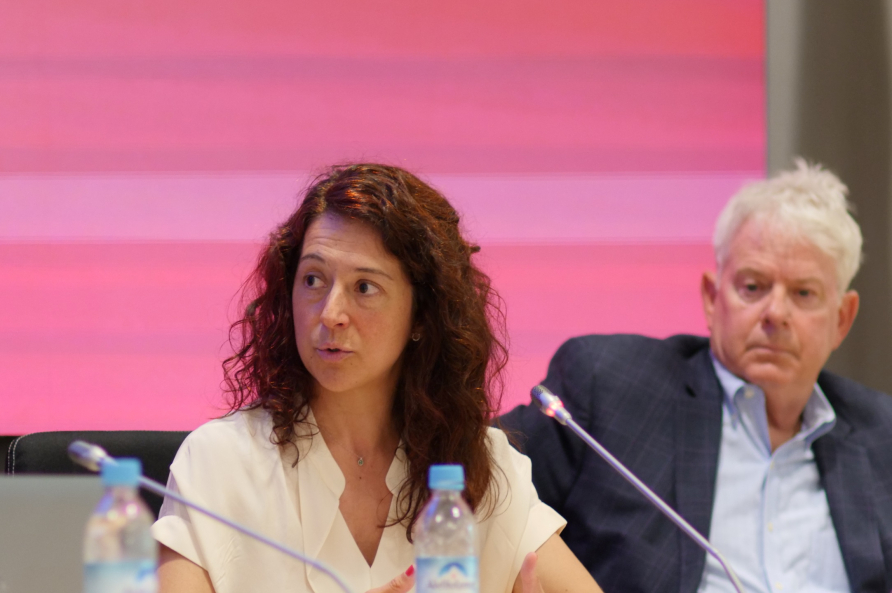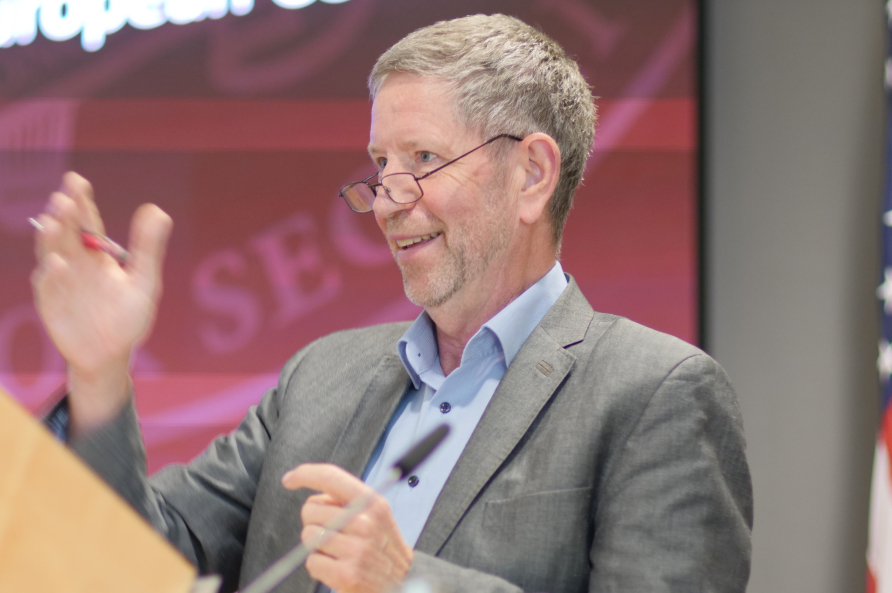The EU as a Strategic Actor
By Dr. Katrin Bastian, Professor of International Relations
GARMISCH-PARTENKIRCHEN, (July 23, 2024) – The Marshall Center hosted 15 subject matter experts from eight European Union member states and the United States on July 19-22 to explore the EU’s role in the world and its ability to act within the context of strategic competition. Participants for the workshop, aptly titled “The European Union as a Strategic Actor,” represented an array of prominent institutes and universities with programs focused on European security.
Marshall Center Director Barre Seguin highlighted during his opening remarks how the Center’s mission to collectively affect regional, transnational, and global challenges aligned with the workshop’s objectives.
“We have invited you to increase our mutual understanding of all of these developments and share each other’s perspectives. Your experiences, insights, and contributions are vital to our collective pursuit of knowledge and impact,” said Director Seguin. “Through collaboration, we can navigate the intricacies of our shared security landscape more effectively
The workshop was structured around three guiding questions: What is the EU’s own interpretation of strategic competition, and how does it see its role in the world and in its immediate neighborhood? What is the EU’s relative power position in the world, and what are the challenges and opportunities of its strategic partnerships with the U.S., China, and India? And finally, how can the EU act as a security provider in an increasingly disruptive security environment?
Considering the multiple crises that Europe is currently confronted with, the themes of the workshop were very timely: Russia’s full-scale war against Ukraine since 2022; Russia’s hybrid war against multiple EU member states; the burgeoning Israel-Hamas and other ongoing conflicts in the Middle East; an assertive China that provides Russia with dual-use components; the U.S. future commitments to security on the European continent in the light of U.S. presidential elections in November 2024; and an overall trend toward polarization in U.S. and European societies, rendering political consensus and compromise ever more difficult.
The workshop brought together seven renowned think tanks including the Centre for European Policy Studies (CEPS) in Brussels; Berlin’s German Council on Foreign Relations (DGAP); the Finnish Institute of International Affairs (FIIA) in Helsinki; Rome’s European Council on Foreign Relations (ECFR); the International Center for Defense and Security (ICDS) in Tallinn; Paris’ EU Institute for Security Studies (EUISS); and Washington D.C.’s Center for European Policy Analysis (CEPA). Two prominent U.S. universities also participated: Georgetown University and the National Defense University, both based in Washington D.C.
The Policy Foresight Unit of the European Parliament in Brussels participated with one of its leading researchers, and Special Advisor to the Chairman of the EU Military Committee, who shared his insights on EU security and defense. Additionally, two prestigious German foundations contributed to the workshop: The Bertelsmann Foundation with its program on Europe’s Future, and the Bundeskanzler Helmut Schmidt Foundation in Hamburg. A Marshall Center alumnus from Bulgaria completed the group of high-level experts.
Some key take-aways at the conclusion of the three-day-workshop included:
- The EU and the U.S. vary in their perceptions of strategic competition. While Washington’s strong focus on China leads it to perceive the evolving world order as increasingly bipolar, the EU has a more differentiated, multipolar perception of the world by acknowledging the rise of influential middle powers in Africa, Asia, and Latin America. In the long run, these perceptional differences may lead to differing appreciations of multilateral organizations to solve global problems.
- A strength of the EU is that it can cope well with the complexities of regional/global governance. The EU is itself a complex organization, being multilateral, intergovernmental, and supranational. As such, it is capable of long and complex negotiations resulting in sustainable compromises. This is also an advantage in region-regional cooperation, e.g., between the EU and Association of Southeast Asian Nations (ASEAN).
- The EU is investing substantially to act with more geopolitical/geo-economic direction. Through instruments like the Global Gateway, the EU is combining its own Green Deal agenda through partnership diplomacy. However, such initiatives on economic security are accompanied by the significant overall decline of the EU’s relative position in the world economy, e.g., aging population; scarce workforce; declining share of global GDP; few indigenous raw materials; and lagging in nearly all new technologies. “Therefore, non-Western middle powers are the swing states determining the future of the global economy,” said Alberto Rizzi of the ECFR.
- When it comes to the EU’s ability to act as a security provider, the EU has accomplished considerable steps to enhance its profile. To a great deal, this has happened as a reaction to Russia’s aggression against Ukraine – a trigger for political unity among EU member states leading to a large-scale, coordinated military and financial assistance to Kyiv, e.g., by the re-dedication of the European Peace Facility.
- The EU Commission, under the second term of Ursula von der Leyen, is likely to strive for the communitarization of the EU defense industrial base and procurement policy as far as possible, e.g., by installing an EU Commissioner for Defense. This suggests that Brussels is prepared to invest in the strengthening of the European pillar within NATO, signaling to Washington the EU’s willingness to “spend more and better” and to keep the U.S. committed on the European continent.
- In order to cultivate the precious transatlantic relationship over the next generation(s), relations require a higher degree of institutionalization across different sectors. “In contrast to the security relationship (with its strong focus on NATO), the transatlantic economic and societal relationships suffer from under-institutionalization,” said Dr. Jeffrey Anderson of Georgetown University. While the Inflation Reduction Act has added to this problem, the launch of the EU-U.S. Trade and Technology Council (founded in 2021) is a step into the right direction.
German Deputy Director, Brig. Gen. (Ret.) Rolf Wagner closed the workshop by acknowledging the fruitful exchange of perspectives during the week.
“The knowledge and perspectives you have shared are invaluable assets that will continue to serve our work on the EU’s capacity to act,” he said. “We are looking forward to staying connected and continuing our cooperation!”
Disclaimer: The views expressed in this article are those solely of the author and do not reflect the policy or views of the George C. Marshall European Center for Security Studies or the Department of Defense.



